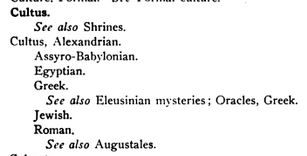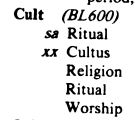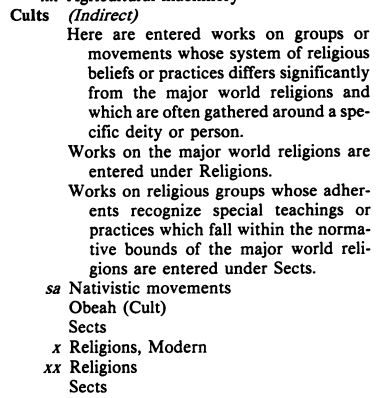Cultus, Cult, and Cults
Suggestions for revising problematic Library of Congress Subject Headings
There are 244 Library of Congress Subject Headings (LCSH) in which the word “cult” appears in either the heading or the subject authority record, including the widely used subject heading Cults. Adam Paradis adeptly explains the problems with using cult in subject headings for religious scholarship in the blog post “A Genealogy of a Subject Heading: ‘Cults,’ New Religious Movements, and Nomenclature in the Academic Study of Religions” (2023), so we will not go into theological analysis in this article. Instead, this article will be a subject heading analysis, meant to explore the problems with and possible resolutions for the use of cult in LCSH.
The fluid definition of “cult” makes it a challenge to use in LCSH, a controlled vocabulary that works best when definitions are static. Originally the term was used to describe rituals in mainstream religions, like Catholicism, as well as to describe the worship practices of ancient peoples, like the Greeks and Romans. Over time, the word began to be used innocuously to describe a “collective obsession,” as occurs in particular types of fandoms such as a “cult film” (Oxford English Dictionary n.d.). However, the term takes a negative turn when used as a label for abusive behavior in a closed group, or as a pejorative or hyperbolic statement (e.g., “That gym is like a cult”). Most concerning is when the label “cult” is given to Indigenous groups in Africa, Latin America, and Asia. This delegitimizes the religious practices of people who are not white or Christian. Scholars have moved away from the use of “cult” for the preferable “New Religious Movement,” making cult outdated for the researchers searching our collections. Moreover, as Harris and Clark note, self-identification needs to be an important part of subject cataloging (1979, 375). Few, if any, people are calling their own religious practices a “cult.” LCSH has not kept up with these shifts in the definition of “cult,” retaining the term in many inappropriate headings. Since this is not how people self-identify, there are a large number of headings that diminish many groups as a “cult” when they should be called a religion, sect, or social movement.
The Origins of Cultus, Cult, and Cults in LCSH
It is helpful to trace the evolution of Cults in LCSH to understand the current problems with the terms and reveal ways that those issues might be resolved. The term Cultus first appears in LCSH in the first published edition in 1909 along with Cultus, Alexandrian; Cultus, Assyrian-Babylonian; Cultus, Egyptian; Cultus, Greek; Cultus, Jewish; and Cultus, Roman (Library of Congress 1909, 1:228). “Cultus” is a noun borrowed from Latin that denotes religious praxis, often in the form of worship or ceremony (Oxford English Dictionary n.d.). It is intended to describe religious action and can be applied to ancient or modern practices. While “cult” includes the meaning of “cultus,” it has the additional function of signifying group distinction. In this sense, “cult” is a collective noun based on an arbitrary sociological distinction that negatively differentiates between types of religious groups by marginalizing or stigmatizing certain groups as less religiously authentic than others. Phil Zuckerman captures this idea in the simple phrase: “One person’s religion is another person’s cult” (2003, 62). He illustrates this point by explaining how bizarre and cult-like an evangelical service could appear to someone who has only experienced Catholic mass. Reciprocally, the somberness of the Catholic mass may seem odd and unnerving to an individual who has only been exposed to evangelical worship.

Figure 1: The subject headings using the term Cultus in the 1909 edition of LCSH
In 1975, Cult was added as an LCSH term with see also from references: Cultus, Religion, Ritual, and Worship (Library of Congress 1975, 1:473). From these terms, we can deduce that Cult was intended to describe works on religious practice, related to Cultus. It would appear that in 1975, LCSH was trying to acknowledge the distinction between Cultus and Cult by using both terms.

Figure 2: The record for Cult as it appears in the 1975 edition of LCSH
In 1980, another term, Cults, was established with a scope note: “Works on groups or movements whose system of religious beliefs or practices differs significantly from the major world religions and which are often gathered around a specific deity or person.” It has see also terms Nativistic movements, Obeah (Cult), and Sects, as well as a see from term: Religions, Modern (Library of Congress 1980, 1:600–601). From the scope note and see also/from terms, it appears Cults was intended to fill the gap where a subject was needed to describe modern cult groups and new religious movements. This makes sense, because the surge in cult movements during the 1960s and 1970s, like Peoples Temple and the Manson Family, would lead to works published in the 1980s.

Figure 3: The record for Cults as it appears in the 1980 edition of LCSH
By the mid-1980s, LCSH had three terms: Cultus, Cult, and Cults. This is not ideal for disambiguation, particularly given the subtle difference between Cult and Cults. Understandably, LCSH revised the terms again in 1986, likely to consolidate all concepts under one term and to roll off the use of the archaic-sounding term cultus (Library of Congress 1986, 1:811–813). However, this revision created our current problem, because all three terms were consolidated despite being about different things. It brought new religions and cult movements (cataloged as Cults) under the same heading as ritual religious practice and groups (Cultus and Cult). This creates a challenge for us to revise or split the term today. If we revise Cults to New religious movements, we will inevitably attach New religious movements to ancient groups and works on religious worship, breaking the subject analysis on thousands of works. If we retain or split the term, we are continuing to use cult in cases where it is inappropriate and offensive.
There are forty subject authority records constructed with Cults subdivided by another term (e.g., Cults—New York (State) and Cults—Greece). One approach would be to identify the subdivided headings that are likely about ancient groups, like Cults—Greece, and change the string to Greece—Religion. Headings such as Cults—United States can be changed to New religious movements—United States (we can assume that any cult in the United States is a new religious movement, given the age of the country). The biggest challenge is addressing records in which Cults is the subject with no specific subdivision terms. This is an area where automation that looks at other data in the whole record could help identify whether New religious movements, Sect, or Religion would be the accurate subject.
Cults and Cult as Qualifier and Broader Term
Beyond the main heading, cult or cults is used in hundreds of records, either in the heading or the authority record (e.g., Hindu cults, Bizango (Cult), Ex-cultists, etc.). There are too many headings to analyze each one for this article. Instead, we selected five examples that capture the issue with cults in LCSH. The free-floating subdivision Cult (e.g., Jesus Christ—Cult) is not covered because this paper is focused on religious movements. However, it will require future discussion and a resolution. The following examples are representative of the issues found in the records and demonstrate the need to address each example of cults as unique. Research for this section includes a search of the subject heading in OCLC Connexion and the Library of Congress Catalog to see how the subject is used in bibliographic records. None of these suggestions are final and may change when proposals are submitted to the Library of Congress.
Afro-Brazilian Cults
According to Subject Headings Manual H 1997—Religion, we should “assign the free-floating subdivision —Religion under headings for individual ethnic groups, including groups of Indians, for works on the religion of these groups” (Library of Congress 2020). The subject string Black people—Brazil—Religion would be preferable to changing this to Afro-Brazilian religions, according to this policy. However, Afro-Brazilian religion is a commonly used term and therefore might be better for scholarly research. A search of OCLC returns 937 results for “Afro-Brazilian religions,” signaling the term’s popularity. The broader term Cults in the authority record would also be replaced with the preferable Brazil—Religion.
Crucifiés (Cult)
This heading is not being used by any records in OCLC, although there is a work cataloged in the subject authority record for a French language book L’Affaire des Crucifiés (2013) by Raymond Ouimet. In OCLC the subjects on L’Affaire des Crucifiés are Sects—Quebec (Province) and Quebec (Province)—Religion. After consulting L’Affaire des Crucifiés, we noted that Ouimet included a French translation of the definition of “cults (secte)” from Cults: Questions and Answers by Michael D. Langone (2013, 20), indicating Ouimet’s intent to categorize the group as a “cult.” This heading could be canceled or changed to a name authority record using the more precise Secte des Crucifiés or Mission des Crucifiés, which is how the group is named in the text.
Hoodoo (Cult)
This case can be resolved by removing (Cult) and leaving the heading as Hoodoo, because it does not require a qualifier to distinguish the term from another. It also better aligns the heading with the pattern established by the LCSH terms Vodou and Santeria. This straightforward approach can be used for many of the headings where cult was added as a qualifier in parentheses, since a qualifier is not needed to disambiguate from other terms.
Ifa (Religion)
Ifa (Cult) was revised in 2010 to change the qualifier from Cult to Religion. This provides us with a precedent for using Religion as the qualifying term instead of Cult in other records. This record will still require revision as a part of this project because there are broader terms listed in the authority record: Afro-Caribbean cults and Cults—Africa, West, which will hopefully be revised too. While many headings can have their qualifier removed, like Hoodoo, there are others where it is still needed. For example, Batuque (Cult) will need a qualifier to disambiguate it from Batuque music.
Lemba (Cult)
There are two Lemba groups in Africa: one in the Democratic Republic of the Congo, and the other in South Africa. This heading is for the group in the Democratic Republic of the Congo, based on its broader terms. LCSH already distinguishes between these two groups by directing the Democratic Republic of the Congo Lemba to Kela (African people), while the South African Lemba are listed as Lemba (South African people). There are only nine works with the heading Lemba (Cult) in OCLC, so the term could be canceled and directed to Kela (African people)—Religion in line with the Subject Headings Manual H 1997. Using Kela is consistent with the way LCSH disambiguates the Lemba (South Africa) and the Kela (Democratic Republic of the Congo) in other terms.
Conclusion
LCSH’s use of cults is messy and inconsistent—much like the use of the term in our society. This article is meant to be a stepping-off point for doing the work to revise the headings. While daunting, the cleanup is necessary and can provide us with opportunities to address inaccuracies and offensive language in the authority records and subject terms. We are working with the Library of Congress Policy, Training, and Cooperative Programs (LC/PTCP) Division to revise cult headings proposals. The next steps of the project will involve revising the headings in several stages to manage the large number of records impacted by the changes made to different religious groups and practices. The goal is to vastly reduce the use of cult in LCSH and, in cases where it is still used, make sure it is appropriate and respectful to the groups being described.
Acknowledgments
We would like to thank the Atla Technical Services Interest Group (TSIG) for providing ongoing advice, as well as the LC/PTCP office staff for supporting this project with their time and expertise.
References
Harris, Jessica L. Milstead and Doris H. Clack. 1979. “Treatment of People and Peoples in Subject Analysis.” Library Resources & Technical Services 23 (4):374–390.
Library of Congress. 1909. Subject Headings Used in the Dictionary Catalogues of the Library of Congress. 1st ed. Vol. 1. Washington: G.P.O., Library Branch. https://catalog.hathitrust.org/Record/001080455.
———. 1975. Library of Congress Subject Headings. 8th ed. Vol. 1. Washington: Library of Congress. https://catalog.hathitrust.org/Record/001080454.
———. 1980. Library of Congress Subject Headings. 9th ed. Vol. 1. Washington: Library of Congress. https://catalog.hathitrust.org/Record/001080454.
———. 1986. Library of Congress Subject Headings. 10th ed. Vol. 1. Washington: Library of Congress. https://catalog.hathitrust.org/Record/001080454.
———. 2020. Subject Headings Manual H 1997—Religion. Subject Headings Manuals. August 2020. https://www.loc.gov/aba/publications/FreeSHM/H1997.pdf.
Ouimet, Raymond. 2013. L’Affaire des Crucifiés: Récit Historique. Québec: Septentrion.
Oxford English Dictionary. n.d. “cult, n.” In OED Online. Oxford University Press. Accessed July 24, 2023a. https://www.oed.com/dictionary/cult_n?tab=meaning_and_use#7736881.
———. n.d. “cultus, n.” In OED Online. Oxford University Press. Accessed July 17, 2023b. https://www.oed.com/view/Entry/45754.
Paradis, Adam. 2023. “A Genealogy of a Subject Heading: ‘Cults,’ New Religious Movements, and Nomenclature in the Academic Study of Religions.” Atla. July 5, 2023. https://www.atla.com/blog/a-genealogy-of-a-subject-heading-cults-new-religious-movements-and-nomenclature-in-the-academic-study-of-religions/.
Zuckerman, Phil. 2003. Invitation to the Sociology of Religion. New York: Routledge.